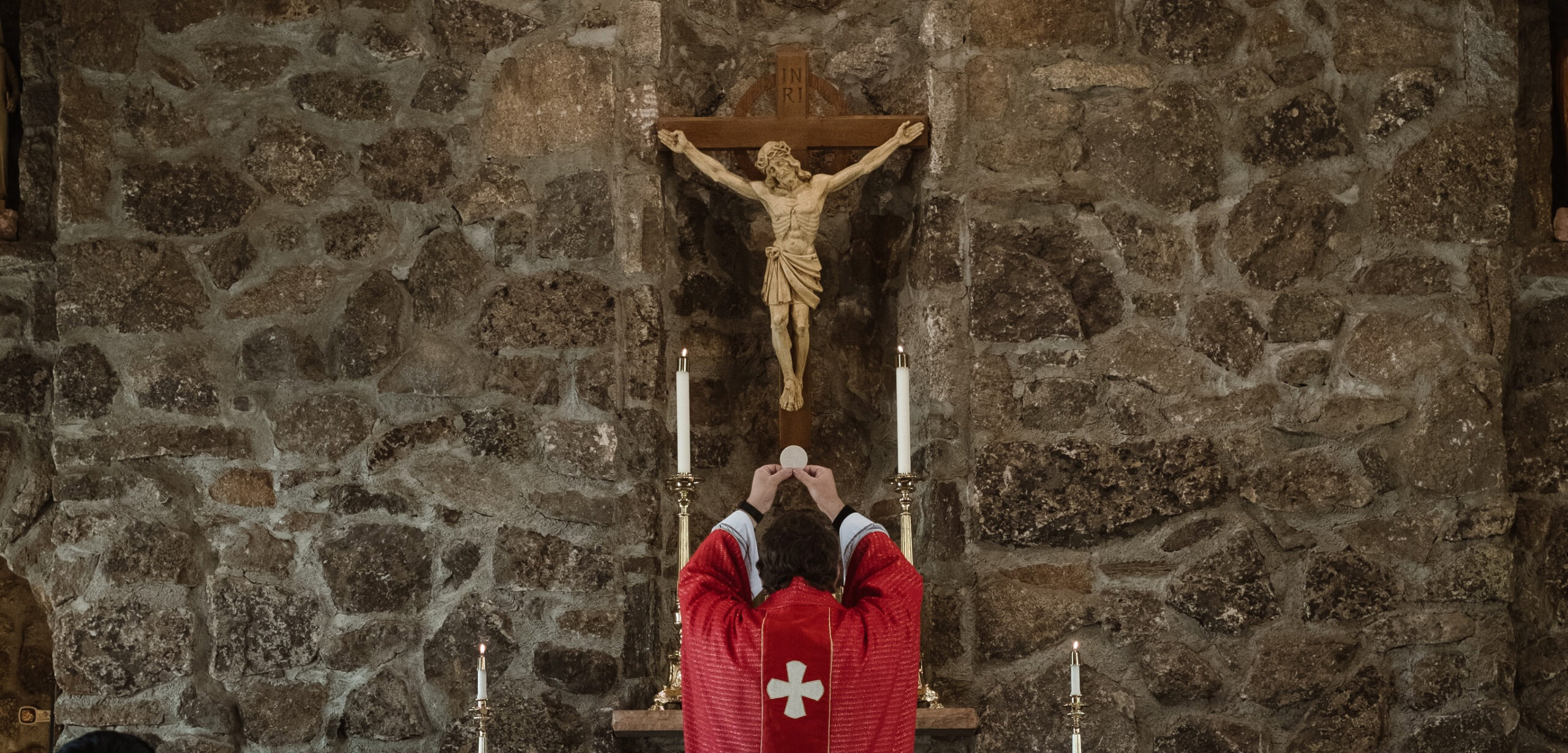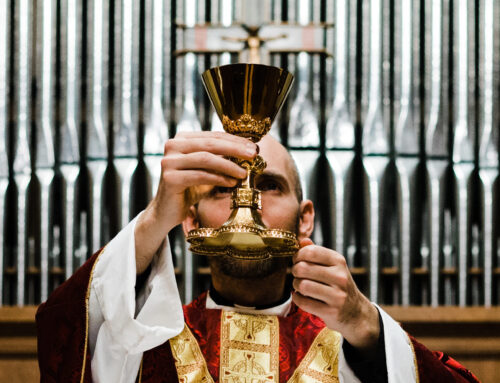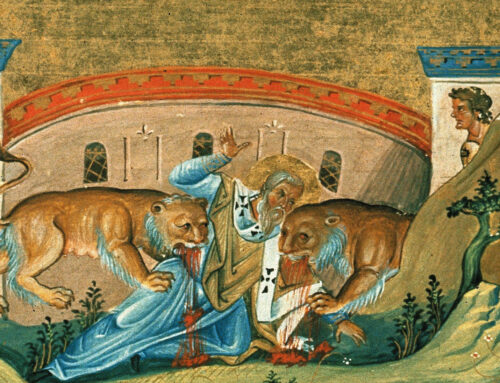I was recently watching a tv show called “The Good Place,” and without giving any spoilers… I got to the part where the characters make it to… the “Good Place,” i.e. Heaven. The only problem is, it’s a very uninspiring version of Heaven. In fact… it’s a straight up boring, monotonous, Godless Heaven.
Now thankfully, this is NOT what the Kingdom of Heaven is actually like. In reality, each one of us has been created for infinite joy and infinite, never-ending celebration. It’s what human beings desire most deeply!
To paraphrase St. Thomas Aquinas, all human beings necessarily crave ultimate, perfect happiness. At times, we might have the wrong idea of what ultimate happiness is — We might pursue things that we assume will make us happy, but really only make us more and more unhappy — but without exception, every person who has ever lived on this planet is on the hunt for infinite joy and infinite celebration. And this is only possible in beholding God forever.
We are content with nothing less. You were made to gaze upon and enjoy God forever, and this is precisely what you are being offered.
That’s why our parable today strikes us as so tragic and, frankly, so insane: Those invited to the wedding feast are offered nothing less than everything Good, everything True, and everything Beautiful — they are offered a seat at the Wedding Feast of the King’s Son! God’s own Son! They are offered infinite joy and infinite, never-ending celebration!
“Everything is ready,” the King says. “Come to the feast!” It’s as if the King is saying: “I know your heart desires Everything — the Total Answer. I mean to give you just that. It’s here for you to receive. Come to the feast!”
And yet for some reason, they simply don’t want to come to the party!
This bizarre reaction reminds me of the creature Gollum from the Lord of the Rings. You remember him? He’s that creepy, scrawny guy who was obsessed and possessed by the Ring. At one point in the books, Frodo and Sam offer Gollum a piece of their treasured Elvish bread to eat. He takes one whiff of the stuff and “a spasm of disgust” comes over Gollum’s face. He attempts to nibble at the bread… but he immediately spits and coughs, crying out: “Dust and ashes — he can’t eat that. He must starve.”
Imagine that! When offered good, nourishing food — food that would satisfy the hunger of anybody else — Gollum was totally uninterested and even revolted. Frodo responds saying: “I’m sorry, but I can’t help you, I’m afraid. I think this food would do you good, if you would try. But perhaps you can’t even try… not yet anyway.” Unfortunately, Gollum had an aversion to the good food offered to him! He wanted nothing to do with it!
In the spiritual life, this terrible and sad state is called Acedia.
Acedia — sometimes referred to as the Noonday Devil or the 8th Deadly Sin — is closely related to the sin of Sloth, but it goes much deeper. Acedia is particularly deadly because it’s a kind of sad indifference toward our highest possible Good — toward God Himself… a sort of sluggish inactivity, apathetic discouragement, and even anxious desire to avoid the Infinite Joy and Infinite Celebration to which we are called.
We see something like acedia at work in those invited to the Wedding Feast in our parable today. The King “dispatched his servants to summon the invited guests to the feast, but they refused to come.” He sends more invitations, and still, they ignore the invitation. Evidently, they want nothing to do with it and seem perfectly ok with missing out. Or maybe they think they’re doing just fine without this feast…?
For whatever reason, those invited are apathetic to the generous, over-the-top offer of God’s generosity!
This sort of thing is all too common in our world today, isn’t it? — God is often the last topic people want to address or talk about. Everyone seems positively allergic to His Presence. Or else they cringe and brush Him to the side out of awkward discomfort or embarrassment.
But all the while, God continues to plead with all of humanity to come and enjoy Perfect Happiness in Him! He is tirelessly pursuing us, just like the King in our parable. That kind of love is unheard of. God is practically begging people to come enjoy PERFECTION. He seems to want us to have Heaven more than we do!
Let’s pause at this point to take a look at something really interesting: Very often, Christianity is accused of being all about repressing desires — that we’re only interested in following rules and not having any fun. And yet here, in Jesus’ parable of the Wedding Feast, the Lord reveals that He is offering us EVERYTHING we could possibly ever want in life — a never-ending, enjoyable party, in fact! — and yet those who are invited STILL don’t seem very motivated or interested.
What’s going on here?
Well, CS Lewis puts it this way: “It would seem that Our Lord finds our desires not too strong, but too weak. We are half-hearted creatures, fooling about with drink and sex and ambition when infinite joy is offered us, like an ignorant child who wants to go on making mud pies in a slum because he cannot imagine what is meant by the offer of a holiday at the sea. We are far too easily pleased.”
That last line is quite striking to me: “We are far too easily pleased.” That’s the problem of acedia at work — a diminishment of our desire for God and a lowering of our expectations. Remember! We were created for nothing less than Infinite Joy and Infinite Celebration!
Do we want that? Do we expect that from our Father in Heaven?
What can shake us out of this spiritual lethargy? What can break through this disenchanted stupor that sometimes drags us down?
The Resurrection of Jesus Christ from the dead.
In the empty tomb, we find a powerful cure for all the indifference and apathy of acedia! How can we remain unmoved when we know Christ is risen? How can we turn down an invitation to his Wedding Feast — the wedding of Heaven and Earth — when we believe he walked out of that awful grave Easter morning? Do we have anything better to do than celebrate and rejoice in that Truth?
It’s what makes us Christians.
That’s our message of hope for the entire world. And that’s what we are celebrating right now — The Resurrection of our Lord. Each and every Sunday, we come to this sacrificial banquet of the Holy Eucharist — the Lord’s Body and Blood, crucified and risen — and we participate even now in the Infinite, Unending Celebration of Heaven. Here, our God says to us, too: “Everything is ready. Come to the feast!”
We hear those words: “Take this, all of you, and eat of it. Take this, all of you, and drink from it. Blessed are those called to the Supper of the Lamb.”
That’s Jesus Himself inviting you to receive all Joy.
When we see the Liturgy from this perspective, we can then see how this event is not something we drag ourselves to out of habit. It’s also not some heavy obligation burdened onto our backs under the threat of mortal sin. Rather, we sincerely WANT to be here. We’ve been personally invited!
You have responded to that invitation! You came to the feast! Praise God for that! I’m grateful you said “yes.” And to those who are united in our prayers from home in the midst of this pandemic, praise God that you so eagerly long for the Eucharist.
Together, let us all fall deeper and deeper in love with God. By our intercession and life in the Spirit, let’s banish all that acedia, all the sad apathy, aversion and indifference that burdens so many people today and prevents them from saying “YES” to God’s invitation to all Joy.
We were made for worship. We were made for the Eucharist. We were made for God’s Infinity.





Leave A Comment